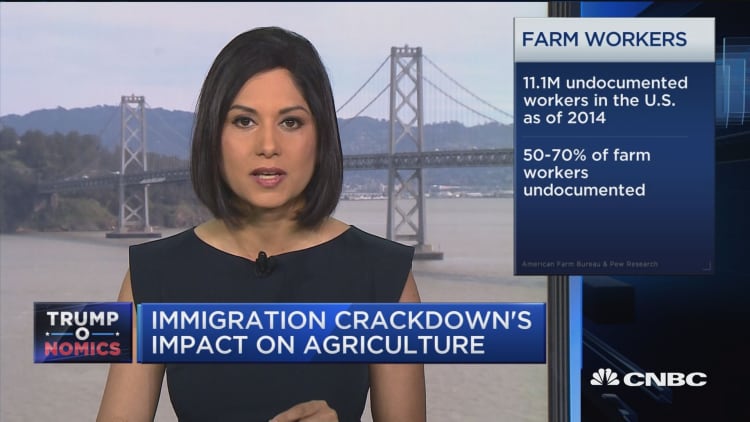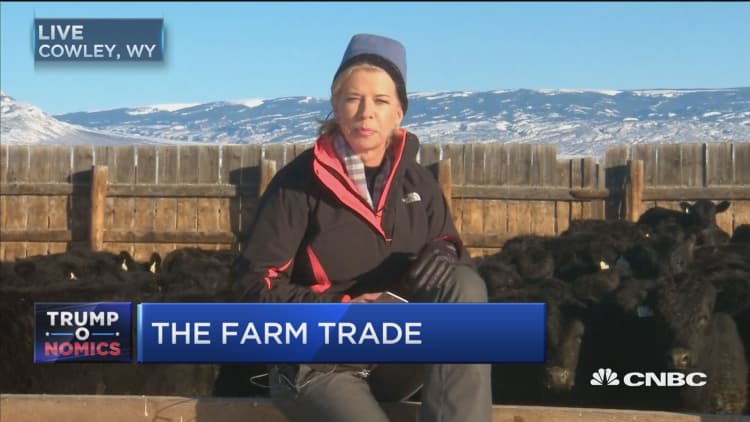There's growing concern in agriculture industry about fallout from anti-Mexico rhetoric in the Trump administration hurting American farmers.
The prospect of a trade war with Mexico is particularly troubling for some in the nation's farm belt given low-commodity prices last year hurt U.S. farm incomes and this year also looks to be tough. Furthermore, many of the key farm states where President Donald Trump found the strongest support in the election could suffer the effects of a trade war with Mexico.
"Mexico is a huge market for the agriculture economy of the United States," said Kurt Hora, who grows corn and soybeans on about 1,800 acres in southeast Iowa and raises thousands of hogs. "We want to make sure we continue to get market access down there."

Mexico is considered one of the most lucrative markets for U.S. agriculture products given its easy access and close proximity to the U.S, whether via rail, ship or truck.
Overall, Mexico is the third-largest agricultural export market for the U.S. and ranks a top market for American corn, barley and poultry. But a so-called "Plan B" by Mexico leaders to wean themselves off U.S. imports could change that.
The U.S. beef and hog producers also have benefited from duty-free access to Mexico's market under NAFTA, the North American Free Trade Agreement. U.S. pork hams are top sellers in Mexico but on Thursday one of Mexico's largest pork processors announced a $550 million multiyear expansion that could see it eventually export to Asian markets now dominated by the U.S. pork industry.
Trump campaigned with a pledge to renegotiate NAFTA and also has talked about getting Mexico to pay for a new border wall through a tax. On Thursday, Commerce Secretary Wilbur Ross said the administration wants to start the NAFTA renegotiation process before Congress leaves on its Easter recess.
Meantime, Mexico has promised to retaliate with tariffs on goods imported from the U.S.
"The rhetoric is getting into the way," said Thomas Sleight, the president and CEO of the U.S. Grains Council, a trade group which develops export markets for corn, barley and related products. "We have buyers and customers that are unhappy with some of the things that have been said."
Indeed, a delegation from Mexico's agriculture ministry is scheduled to travel to Argentina and Brazil next week to discuss the expansion of ag trade ties. CNBC reached out to the ministry for comment. Mexico is said to be looking at a duty-free trade pact on corn with Argentina and Brazil.
"They're actively looking for alternative suppliers," said Sleight, who just returned from a trip to Mexico last week. He said there's talk south of the border about a "Plan B," or strategy by the Mexican leaders to reduce the country's reliance on the U.S.
A decline in agricultural trade with Mexico would be an economic blow to American farmers but could have ripple effects for consumers too. Earlier this year, the Trump administration discussed a possible border tax on imports from Mexico that would result in higher prices on all products, including Mexico's popular avocados.

Under NAFTA, ag trade with Mexico has risen from $7.3 billion in 1994 to nearly $20 billion recently. Corn exports to the Latin American nation were valued at more than $2.3 billion in the most recent year and soybeans, dairy, pork and beef were each markets with $1 billion or more in value.
"If we can continue sending the corn going down, there that helps our economy, and I know it helps the people in Mexico out with being able to feed the people they need to," said farmer Hora, who also serves as president of the Iowa Corn Growers Association. Iowa is the nation's largest corn producer, with about 15 percent of the production going to exports in 2016.
Even so, South America's ag markets are seeing bigger crops and becoming more competitive with U.S. producers.
"With the backdrop of record South American crops getting larger, Argentine corn has now replaced U.S. corn as the cheapest corn in the world," BMO Capital Markets analyst Kenneth Zaslow said in a March 14 report.
Moreover, the strong U.S. dollar can increase the cost to import American goods and thus can negatively impact demand for U.S. corn.
"The dollar does affect things and you have to take it into consideration," said Sleight. "But one thing that really works in the U.S. favor internationally is the fact that international freight is pretty inexpensive right now."
The concerns about U.S.-Mexico trade come as Trump's nominees to fill key trade and ag posts still are pending full Senate approval.
Agriculture secretary nominee Sonny Perdue received the backing of the Senate Committee on Agriculture, Nutrition, and Forestry on Thursday but a vote by the full Senate might not happen before the Easter break. Similarly, the nominee to be the U.S. Trade Representative, Robert Lighthizer, hasn't received a vote by the full chamber.
"We want the Secretary of Agriculture and USTR positions to be filled, as trade is important to the ag sector," said David Salmonsen, a senior director of congressional relations for the American Farm Bureau Federation. "We want to keep the trade we have with Mexico and not have any barriers that would result in decreased trade."
Watch: Fitbit for cows



